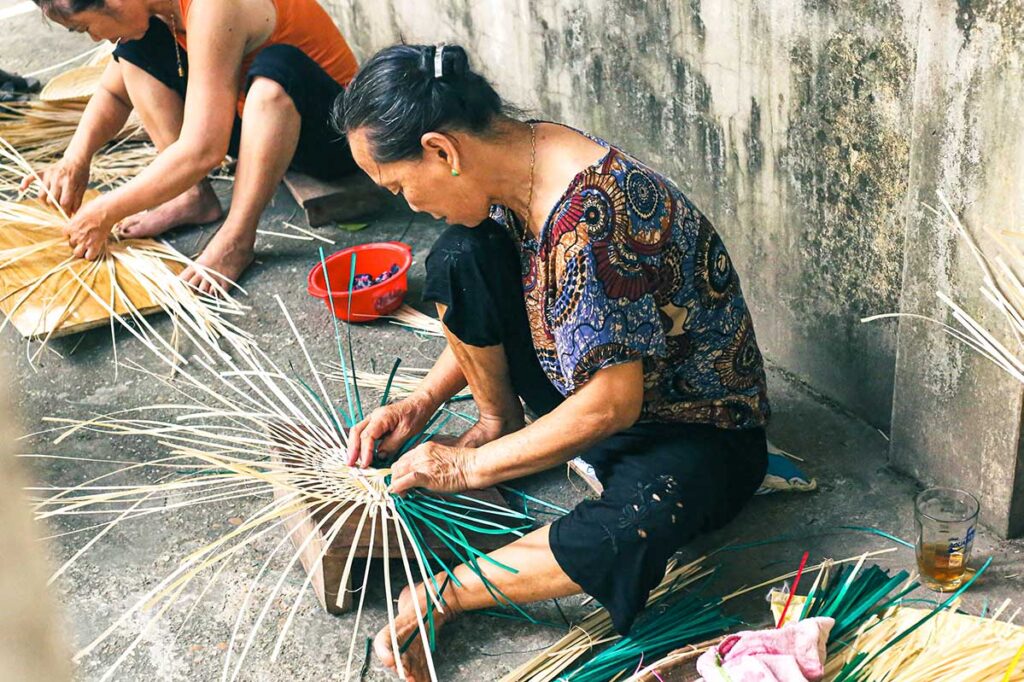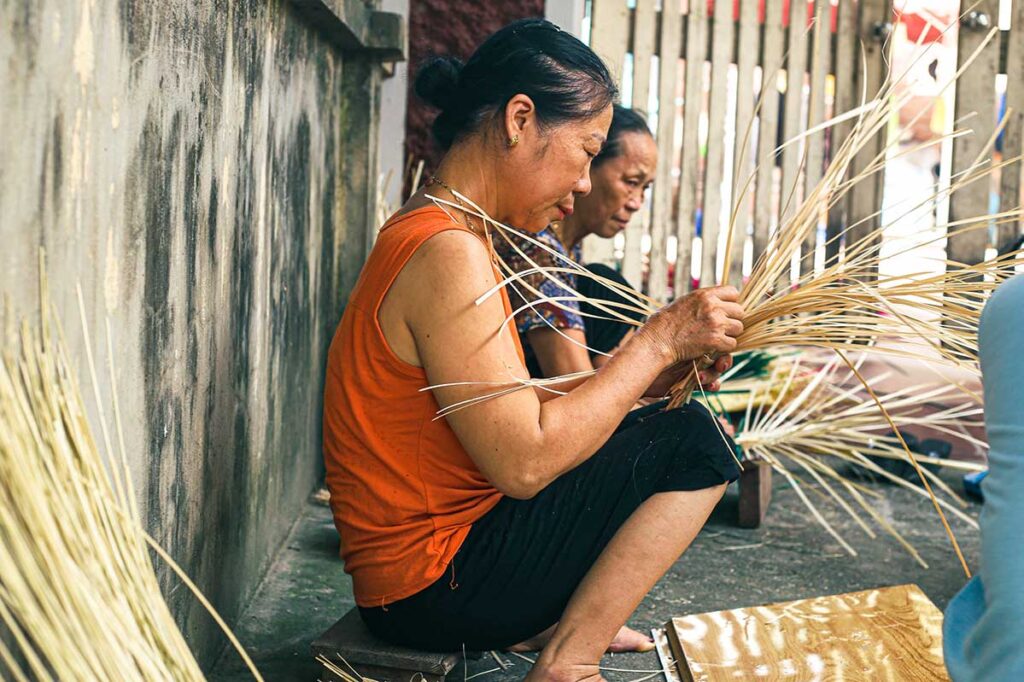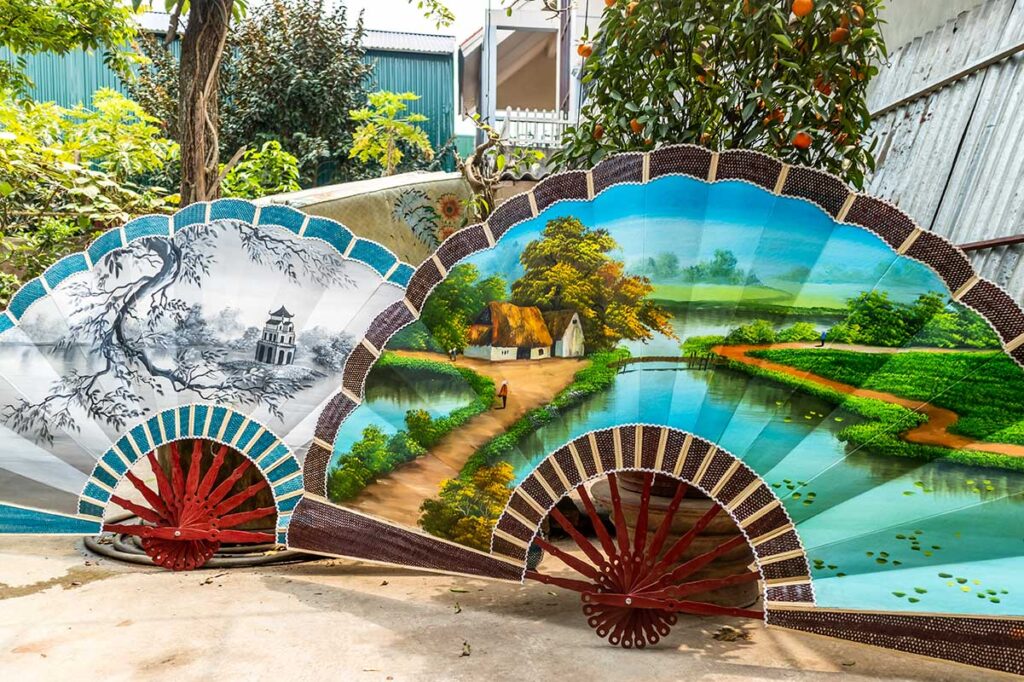Nestled just 40 kilometers from Hanoi, Chang Son Hand Fan Village offers a unique glimpse into traditional Vietnamese craftsmanship. Renowned for its intricate and beautifully crafted hand fans, this village has maintained its artisanal heritage for centuries. As you wander through its streets, you’ll encounter skilled artisans meticulously crafting fans, each a testament to their dedication and expertise. Visiting Chang Son is more than just a sightseeing experience—it’s an opportunity to step back in time and appreciate a craft that has been passed down through generations.
What is Chang Son Hand Fan Village?
History
Chang Son Village, located in Thach That District, has a rich history that dates back over 200 years. Known for its hand fan craftsmanship, the village has long been celebrated for producing some of the finest fans in Vietnam. These fans were once favored by the royal court and have since become cherished items in many Vietnamese households. The tradition of fan making in Chang Son is not just a livelihood but a cultural heritage that reflects the artistry and ingenuity of its people.
The Craft of Hand Fan Making

At the heart of Chang Son’s legacy is its unique hand fan craft. Using locally sourced bamboo, artisans create a variety of fans, from simple, functional designs to ornate, decorative pieces. The bamboo is chosen for its flexibility, maturity, and resistance to mold, ensuring the fans are durable and long-lasting. These fans are not only practical for cooling but also serve as beautiful decorative items and meaningful souvenirs.
Process of making a Chang Son Fan
Creating a hand fan in Chang Son Village is a meticulous process that highlights the artisans’ expertise. It starts with selecting bamboo tubes that are flexible, mature, and resistant to mold. These tubes are cut and soaked in water for several months to ensure durability.
Selecting the Bamboo: Artisans carefully choose bamboo tubes that are flexible, mature, and resistant to mold. These tubes are then soaked in water for several months to ensure durability.
Splitting and Shaping: The bamboo is meticulously split into thin, uniform slats. These slats are then shaped and bent into the desired arched form of the fan.
Covering: The fan frame is covered with carefully selected paper or silk fabric. This process demands precision to avoid wrinkles and ensure a smooth, even surface.
Decoration: This is where the fan truly comes to life. Skilled artisans may paint intricate designs, write elegant calligraphy, or create unique patterns by punching tiny holes into the bamboo. Fabric fans are often adorned with beautiful embroidery.
Drying: The finished fan is then carefully dried, either on bamboo racks or by laying them out in the sun. This final step ensures the fan’s quality and longevity
Highlights of Chang Son Hand Fan Village
See how they make hand fans the traditional way

One of the most captivating experiences in Chang Son is watching the artisans at work. You can observe each step of the fan-making process, from splitting the bamboo to the final decoration. This firsthand experience provides a deep appreciation for the skill and effort involved in creating these beautiful fans.
Make beautiful fans by yourself
Many workshops in the village offer hands-on experiences where you can try your hand at making your own fan. Under the guidance of a skilled artisan, you’ll learn the basics of fan making and create a personalized souvenir to take home. It’s a fun and engaging activity that allows you to connect with the local culture in a meaningful way.
Buy Chang Son Fans as souvenirs

No visit to Chang Son is complete without purchasing a hand fan. The village’s market offers a wide range of fans, from simple designs to elaborate, artistic pieces. These fans make perfect gifts and souvenirs, capturing the essence of Vietnamese craftsmanship and tradition.
Explore the Area Around Chang Son
While in Chang Son, take the opportunity to explore the surrounding area, including two famous pagodas: Tay Phuong Pagoda and Thay Pagoda. These historic sites offer serene landscapes, intricate architecture, and a glimpse into Vietnam’s rich cultural and religious heritage. Combining a visit to these pagodas with a trip to Chang Son Village makes for a full day of discovery and exploration.
How to Get there from Hanoi
Chang Son Hand Fan Village is approximately 40 kilometers from Hanoi, which takes about 1 to 1.5 hours by car, depending on traffic. The best way to reach the village is by private car with a driver or by arranging a private tour.
Private car with driver
The most convenient way to visit Chang Son is by hiring a private car with a driver from Hanoi. This option is more practical and cost-effective than taking a taxi for such a distance. A private car allows you the flexibility to explore at your own pace. The driver will wait for you while you visit the village and can also take you to other attractions in the area, such as the Tay Phuong Pagoda and Thay Pagoda, making the trip more worthwhile.
Private tour
Opting for a private tour is similar to hiring a car with a driver, but it includes additional benefits. A private tour usually comes with an English-speaking guide who can provide insights and historical context, as well as handle entrance fees and meals. While group tours to Chang Son are not available, a private tour ensures a personalized and comprehensive experience.
If you’re interested in visiting Chang Son Hand Fan Village, we at Local Vietnam can arrange both private tours and drivers. We can also help design an itinerary that suits your interests. Just contact us with your preferences, and we’ll handle the rest.
Is it worth visiting Chang Son Hand Fan Village?
Considering the travel time from Hanoi, a visit to Chang Son Hand Fan Village alone might not seem worth it. However, combining it with nearby attractions like the Tay Phuong Pagoda and Thay Pagoda can make the trip more rewarding. This way, you get to experience a unique craft village and explore significant cultural and historical sites in the region.
Other craft villages around Hanoi
Explore the vibrant craft villages around Hanoi. Quang Phu Cau Incense Village showcases incense making, Bat Trang Ceramic Village offers pottery, and Van Phuc Silk Village specializes in silk. Discover the history at Duong Lam Ancient Village, the unique culture of Le Mat Snake Village, and the crafts of Chuong Conical Hat Village and Quat Dong Embroidery Village.


